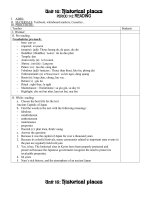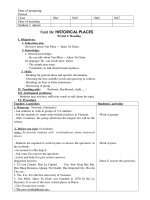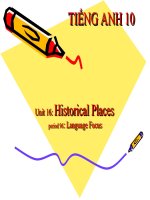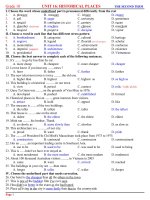UNIT 16 HISTORICAL PLACES
Bạn đang xem bản rút gọn của tài liệu. Xem và tải ngay bản đầy đủ của tài liệu tại đây (2.67 MB, 28 trang )
<span class='text_page_counter'>(1)</span>
<span class='text_page_counter'>(2)</span>
<span class='text_page_counter'>(3)</span> Match the name of each place with one of the words.. Mausoleum. Citadel. Cathedral. Harbor. Ho Chi Minh’s Mausoleum. Hue Citadel. Duc Ba Cathedral. Nha Rong Harbor.
<span class='text_page_counter'>(4)</span>
<span class='text_page_counter'>(5)</span> GUESS THE PICTURE An A A An AAnoun, noun, verb, verb, verb, adj, adj, noun, connected a to based a to ato series reptile see Southern the cut develop on something design words ofwith with or rulers Asian quickly believing a or or or hard of similar designs happen tree style a country and round the with toof be (typically feudalism. on teachings shell, structures a who successful wood, building all that abelong stone, of crime lives that the or grow metal, buildings. Chinese to or on common. the an land accident). down same etc. and philosopher from family. moves thevery Confucius. branches slowly.to It can the ground pull its head and then and growinto legs intoits new shell. roots and trunks.. 1. 2. Architecture. Confucian. 4. Feudal. 5. Dynasty. 7. Tortoise. 8. Flourish. Banyan tree Engrave. Witness. 3 6 9. Flourish Banyan tree Tortoise Dynasty Architecture Witness Feudal Confucian Engrave.
<span class='text_page_counter'>(6)</span> PRONUNCIATION. 1. Flourish /ˈflɜːrɪʃ/ (v): hưng thịnh, thịnh vượng 2. Banyan tree /ˈbænjən triː/ (n): cây đa 3. Tortoise /ˈtɔːrtəs/ (n): con rùa 4. Witness /ˈwɪtnəs/ (v): chứng kiến 5. Architecture /ˈɑːrkɪtektʃər/ (n): công trình kiến trúc 6. Dynasty /ˈdɪnəsti or ˈdaɪnəsti/ (n): triều đại 7. Feudal /ˈfjuːdl/ (adj): phong kiến 8. Confucian /kənˈfjuːʃən/ (adj): thuộc về Nho giáo 9. Engrave /ɪnˈɡreɪv/ (v): khắc, trổ, chạm..
<span class='text_page_counter'>(7)</span> ANSWER THE QUESTIONS 1. Is Van Mieu-Quoc Tu Giam a historical place? 2. What do you know about it?.
<span class='text_page_counter'>(8)</span>
<span class='text_page_counter'>(9)</span> HẾT GIỜ. 10 453967128. III. Multiple Choice: Choose A, B, or C that best suits the meaning of the italicized word. 1. Van Mieu was originally built in 1070 in the Ly dynasty. a. beautifully. b. initially. c. finally. . K.
<span class='text_page_counter'>(10)</span> 10 453671289. HẾT GIỜ. III. Multiple Choice: Choose A, B, or C that best suits the meaning of the italicized word. 2. It is representative of Confucian ways of thought and behavior.. a. typical. b. fond. c. traditional. . K.
<span class='text_page_counter'>(11)</span> 10 453671298. HẾT GIỜ. III. Multiple Choice: Choose A, B, or C that best suits the meaning of the italicized word. 3. Văn Mieu was a place to memorialize the most brilliant scholars of the nation.. a. ignore. b. gather. c. honor. . K.
<span class='text_page_counter'>(12)</span> 10 453671298. HẾT GIỜ. III. Multiple Choice: Choose A, B, or C that best suits the meaning of the italicized word. 4. The stone stelae were engraved with the names of the top students in royal examinations.. a. printed. b. carved. c. washed. . K.
<span class='text_page_counter'>(13)</span> 10 453671298. HẾT GIỜ. III. Multiple Choice: Choose A, B, or C that best suits the meaning of the italicized word. 5. The banyan trees in Van Mieu continue to flourish even now.. a. slow down. b. fall off. c. grown well. . K.
<span class='text_page_counter'>(14)</span> LUCKY PLACE 3. 4 5. 1. 6 2.
<span class='text_page_counter'>(15)</span> 1. The construction of Van Mieu took place between 1076 and 1779. it was built in 1070 T F .
<span class='text_page_counter'>(16)</span> 2. Quoc Tu Giam is considered to be the first university of Vietnam. T F .
<span class='text_page_counter'>(17)</span> 3. Thousands of talented men were trained in Quoc Tu Giam from the 11th to the 19th century. from 11th to the 18th century T F .
<span class='text_page_counter'>(18)</span> 4. Van Mieu has now lost most of its traditional Vietnamese architecture. T F It is an example of well-preserved traditional Vietnamese architecture.
<span class='text_page_counter'>(19)</span> 5. Festivals and examinations used to be held in Van Mieu – Quoc Tu Giam. T F .
<span class='text_page_counter'>(20)</span> 6. Visitors can still see some trees which have been in Van Mieu for a long time. T F .
<span class='text_page_counter'>(21)</span> Lucky place!.
<span class='text_page_counter'>(22)</span>
<span class='text_page_counter'>(23)</span>
<span class='text_page_counter'>(24)</span>
<span class='text_page_counter'>(25)</span> Work in groups of 4 to ask and answer the following questions 1. Why is Van Mieu-Quoc Tu Giam a place of interest? Because it is a famous historical and cultural site in Hanoi. 2. When and where were they built? They were built in Hanoi in 1070 and in 1076. 3. What were their functions? Quoc Tu Giam was the first university of Vietnam. Van Mieu was a place to honor the most brilliant scholars of the nation. 4. What is special about the stelae there? On the stone stelae, standing on the backs of giant tortoises, were engraved the names, places of birth and achievements of top students in royal examinations..
<span class='text_page_counter'>(26)</span> Work in groups of 4 Student 1st : A foreigner – puts questions about Van Mieu Quoc Tu Giam. Student 2nd : Student 3rd : Vietnamese students – answer the questions. Student 4th :.
<span class='text_page_counter'>(27)</span> * Learn by heart the new words. * Write a paragraph about Van Mieu – Quoc Tu Giam. * Prepare for the next lesson.
<span class='text_page_counter'>(28)</span> THANK YOU Presented by: Nguyễn Thị Lệ Huyền FOR YOURNguyễn ATTENTION ! Thị Hoàng Luật. Goodbye ! Celinne Dion – And so this is Xmax.
<span class='text_page_counter'>(29)</span>









